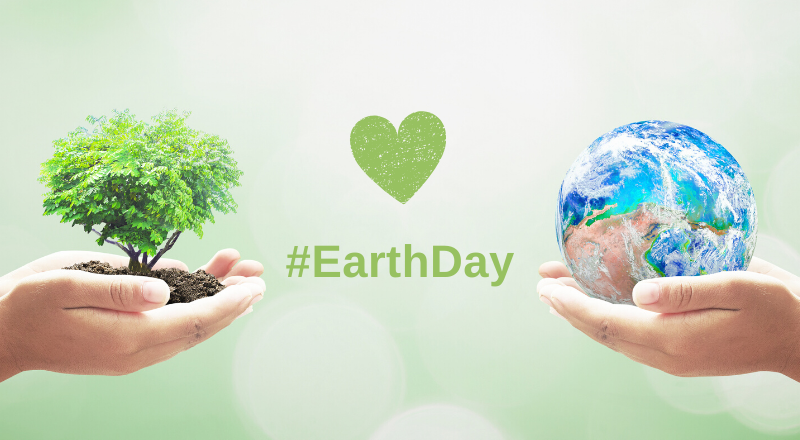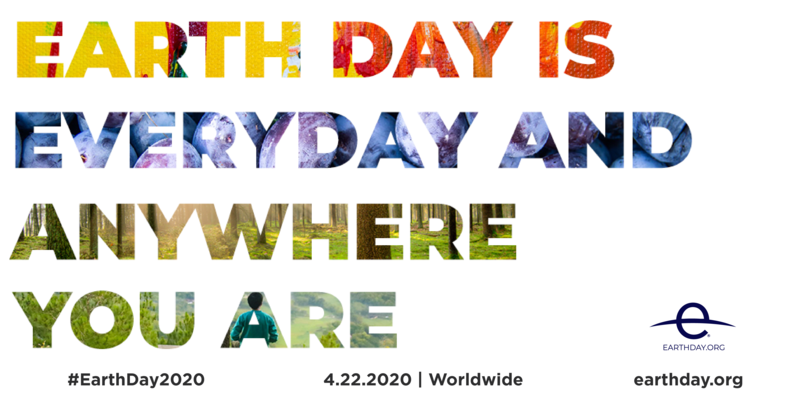Earth Day: positive actions for a planet in need of intensive care
EAUC writes about Earth Day, the roles of universities and colleges in coming to the aid of our ailing planet, and how Covid-19 will impact our Earth moving forwards.
You can find out more about EAUC here.
Today is Earth Day. We might think that of every day, with the obvious exception of astronauts – but this is a particular kind of Earth Day. Run by Earth Day Network, originating in the US, the annual event (22nd of April) has become a mainstay on the global calendar.
Half a century on since the first designated Earth Day, which is credited as the impetus for many of the global environmental movements we see today, and we are looking at Earth through the lens of a pandemic.
If the Earth was in trouble before, it is currently on life support as Covid-19 ravages the communities living on it. We are living through an incredibly difficult time, economically and socially – and those are two out of three of the core pillars to sustainable development on Earth. A healthy planet is not only about the environment. There is a crucial balance to be struck.
So on this Earth Day, an Earth Day full of fear and hardship for much of the world’s population – we want to look at some positive actions. This year’s Earth Day theme is Climate Action. Covid-19 is a largely unpreventable and unpredictable crisis, Climate Change and the consequential damage it is causing is a preventable crisis with much more warning.
We have reams and reams of scientific research on the Climate Crisis. We know what is causing it, and we know how to stop it. The issue, is that to stop it means transformative behaviour change on a scale never before seen in peacetime – until now with the Covid-19 restrictions.
The role of universities and colleges in the fight against the Climate Crisis is often underestimated. They are key in equipping the next generation to have the knowledge, skills, attitudes and values needed to address the Climate Crisis. They cover large expanses of land geographically, and the changes they make on their campuses to reduce their GHG emissions do have an impact on their local vicinity, their country and of course, globally. Financially, they wield a lot of power, and this can provide resource and capacity to sustainable development projects. Last, but by no means least, they have access to a powerbank of academics and research capabilities. If Earth is the question, education is the answer – this is where transformative behaviour change starts.
So for Earth Day, we wanted to show just a few of the sustainability initiatives universities and colleges in the UK and Ireland have undertaken, and look at areas in which many institutions could start or improve their contribution towards fighting climate change and supporting our planet. We will also talk a little about the role of Covid-19 in all of this and what actions we can all take at the moment, even in lockdown, to help Earth – because, there is no Planet B.
Positive and innovative actions in UK and Ireland universities and colleges
The Green Gown Awards are an annual awards programme that celebrate the very pinnacle of best practice in a sector that is well ahead of the curve on the sustainability agenda. If you are looking for more examples of where the sector is leading on the sustainability agenda, have a look at finalists and winners from the last few years on the Sustainability Exchange. It will truly inspire you.
Here are some of the recent winners and finalists:
James Boyd – winner of the ‘Research with Impact (student)’ category – created a tool that calculates carbon sequestration of trees on campus and means the campus can take this into account when look at developing areas and can use this data to make recommendations on carbon mitigation and offsetting.
University of Nottingham –Highly Commended in the ‘Benefitting Society’ category - Project SCENe is a Sustainable Community Energy Network. It looks to accelerate the adoption of community energy schemes, which can help promote the infrastructural, social and cultural changes we need to reduce the impact of climate change and increase energy security. It includes an urban solar farm, Europe’s largest community energy battery and local thermal energy production, distribution and storage.
Lancaster University – Highly Commended in the ‘Campus Health, Food and Drink’ category – The ‘Lancaster University Campus Community Fridge’, the first of its kind in the UK, is helping to reduce food waste, raise awareness of the global issue and make free food accessible to people every day. An ever-growing team of student volunteers coordinate daily collections of unsold food, donated by on-campus providers, with the collected food made freely available for anyone to take via a communal fridge and dry store
Borders College – Winner of the ‘Best Newcomer’ category - Borders College, in partnership with SHARC Energy Systems, completed the installation of the UK’s first heating plant using sewage/waste water as a sustainable heat source within a joint HE/FE Campus with multiple building types, ages and construction designs at their Galashiels Campus.
Keele University – Finalist in the ‘Student Enterprise’ category - ‘Weigh to Go’ is an innovative student-led zero waste shop hosted within Keele Students’ Union shop.
Coleg Gwent – Highly Commended in the ‘Tomorrow’s Employees’ Category – ‘Cash4Change’ (C4C) is a project where students can bid for money to make sustainable changes at their campus. This scheme was set up by the college and Coleg Gwent Student’s Union CGSU to support projects, clubs, events and ideas that make life at Coleg Gwent more enriching, benefit the college and local community and improve the environment.
What can institutions do to better support the planet?
There are many actions institutions can take, and one thing we can tell you from our decades of working with universities and colleges is that the actions needed will likely be different for each institution.
It is important to take time to work out what your institution already does well when it comes to contributing towards sustainability, and where it could improve. The best way to work this out is to sign up to the Sustainability Leadership Scorecard. This is free for UK and Ireland institutions, and will allow you to work out where you are currently, and where you need to improve. The scorecard is a framework, broken down into four areas:
- Leadership, Staff & Governance
- Campus, Community & Operations
- Partnerships, Society & Engagement
- Learning, Research & Students
What can you do while in lockdown to help the Earth right now?
Covid-19 is currently wreaking devastation globally, our universities and colleges are rightly focused on supporting their staff, students and communities to get through this. But while your university or college might be unable to prioritise sustainability right now, if you are at home – there are some things you can do.
We have created a ‘10 things to do at home to help Earth during coronavirus lockdown (and beyond)’ list and we would encourage you to read it and try to tick them off.
This year, 22nd April 2020, is an Earth Day like no other. It is bittersweet – a reminder of how simultaneously fragile and resilient our Earth and its people are. There will be long-lasting negative ramifications from this pandemic, from the immediate tragedy of fatalities, to the impact on people’s mental health and wellbeing and the economy. The education sector will not be spared, there will be institutions that struggle financially, people will lose their jobs, students will be hugely impacted in a whole range of ways – and so much more. But, let’s lock in the silver linings of this awful situation as best we can: there will be improved air and water quality, reduced GHG emissions, biodiversity improvements, increased community engagement, and a big shift towards technology to enable work to continue without travel. These are temporary improvements, but with transformative behaviour change, which we know is feasible after the global lockdown, these can be permanent, and we can start to repair some of the damage we have done to the Earth.
Things will never be the same, this is not business as usual, and there is an opportunity here to make sure the new norm is sustainable.
You can find out more about EAUC here.












